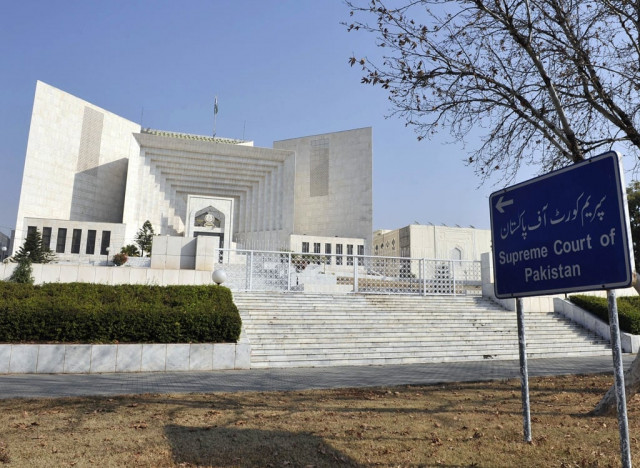Input from Centre, provinces: SC seeks plan to tweak criminal justice system
Says executive’s failure to redress grievances of citizens creates frustration .

The Supreme Court of Pakistan. PHOTO: AFP
The apex court has sought a ‘comprehensive and effective plan’ from federal and provincial governments for improvement in criminal justice system to ensure resolution of people’s grievances in shortest possible time.
Hearing different complaints against police, Supreme Court’s two judge bench – headed by Justice Jawwad S Khawaja – on Thursday observed that citizens file a large number of complaints against police and other provincial departments on a daily basis.
The bench noted that numerous complaints could not be adequately dealt with by the SC nor was it its prime function to go into the transparency of police investigation.
“However, in some of the cases, high degree of apathy is found on the part of the police, which translate into the executive’s failure to redress grievances of citizens. This creates frustration that leads to lawlessness in society,” the bench said.
Justice Khawaja said Asian Development Bank had given Rs400 billion for Access to Justice Programme in the past but it is not clear where this huge amount was spent. “According of an estimate, our criminal justice system is so slow that its takes around 25 years from the institution of a case to its disposal by the apex court,” the judge said.
He also lamented that in Pakistan’s history not a single PSP police officer was dismissed over poor investigation in any case in Punjab while only one such instance could be found in Khyber-Pakhtunkhwa (K-P).
Appearing before the bench, Sindh Additional Prosecutor General Saleem Akhtar said independence of prosecution department was undermined by new legislation as now the prosecutors were working under the influence of political government. Upon this, the bench asked him to file these grievances in writing.
Punjab Advocate General Hanif Khatana said he will recommend the police authorities to take initiatives for making complaint cell effective in every district of province.
Meanwhile, the Punjab government also submitted its report on criminal justice system, which said that 1,500 have been recruited in Counter Terrorism Department and are being given extensive training.
Punjab’s chief secretary informed the SC that 1,500 sub-inspectors have been inducted for investigation and five ordinances promulgated. “Registration of an FIR is being made easier and effective monitoring/accountability is being employed to root out inefficient and dishonest investigation,” he claimed.
Punjab Home Department said the FIR registration mechanism is being reformed and complaint registration will now be possible through SMS and web-based software. Specific timelines have been outlined at different tiers. Moreover, a new cadre has been created in the police stations for police record management, it said.
“Through this initiative, initially 20 senior station assistants and 80 police station assistants will be recruited through NTS. The officials will replace Moharrirs in police stations for registration of cases,” the report said.
The report said a committee is constituted – having representatives from Lahore High Court (LHC), home department and Punjab Information Technology Board (PITB) – for the maintenance of record of stock witnesses/touts, adding that this software will be first installed at the LHC and then will be applied to subordinate courts.
The Punjab government is also considering changing the Thana culture by creating public-friendly environment in police stations, computerisation of crime record, efficient complaint redressal mechanism, installation of the CCTV and Android-based function monitoring, it said.
“Disciplinary proceedings under E&D rules 1979 and criminal proceedings under Anti-Corruption Laws as well as under the PPC can be initiated against incompetent/defiant and dishonest investigation,” the report said.
Published in The Express Tribune, January 30th, 2015.


















COMMENTS
Comments are moderated and generally will be posted if they are on-topic and not abusive.
For more information, please see our Comments FAQ